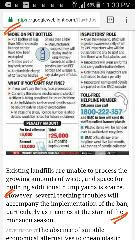Are dustbin bags, sticky bags, half liter water bottle, etc. banned?
Political posters in flex material are not penalised! So does it mean flex material is exempt selectively? Or is political fraternity exempt from discipline?
Do you mean to say citizens should carry steel vessels to buy milk, meat, fish, etc. all the way to their workplaces so that they can shop on their way back home after a long day?
Don't you think exempting branded packaged goods and foods in plastic is discriminatory to small businesses?
Such and many other doubts began circulating on WhatsApp as the plastic ban was announced by the State of Maharashtra.
If such confusion was expected by design as a strategy then it's a good move by the administrators.
Good because such confusion forces people to think intentionally as it has happened already. As a result, people have at least begun thinking of alternatives out of fear of punishment though.
But targeting to achieve any (Zero-Plastic kind of) result measures without enabling the corresponding processes in place always have had serious implications with associated costs. Time and again this has got proven by itself.
In Nagpur, for instance, out of fear some people got rid of banned plastic bags by dumping them in rivulets.
If such confusion, however, is by chance then there's a bigger worry.
Bigger worry because it might mean, there's a lack of well-designed time-bound plan, also lack of the design to execute the ban itself holistically expecting it to aim Zero-Plastic target! In fact, adequate design learning from others (especially from countries successful in handling the plastic menace) is the first step in any such project. Bigger worry because lack of meticulousness in such initiatives usually leads to sub-optimisation harming the nobility of the purpose itself.
Unless every stakeholder gets mindfully engaged in averting the plastic-pollution-menace and the forthcoming disaster therefrom, the costs of the short term approaches towards it will get out of control. There's a need to take a relook at it in order to scrutinise the blanket-ban, if any, if not done so already.
Better also to be innovative on making the recycling more effective. Not only does the arrest of the plastic need to be at manufacturing level but also at desire-based or want-based consumption level. A pictorial do-don't will go a long way in preventing the confusion among the users and the administrators.
In any case the Zero-Plastic target is an arduous task at least in near future since for some applications cost effective substitute is yet to get invented.
Sustainability of the planet is the priority number-1 but the ban itself needs to be sustainable for that!
Here's my 140 character Tweet plan of action (POA) revolving around the Kaizen technique: *MISER!
Be a MISER stakeholder on Plastic!
MINDFUL of enabling process to evolve Zero-Plastic result!
INNOVATE packaging!
SCRUTINISE blanket-ban!
ELIMINATE production!
REDUCE, REUSE! Collect to RECYCLE!
INNOVATE packaging!
SCRUTINISE blanket-ban!
ELIMINATE production!
REDUCE, REUSE! Collect to RECYCLE!
(*MISER: Minimise. Improvise. Simplify. Eliminate. Reduce.)




